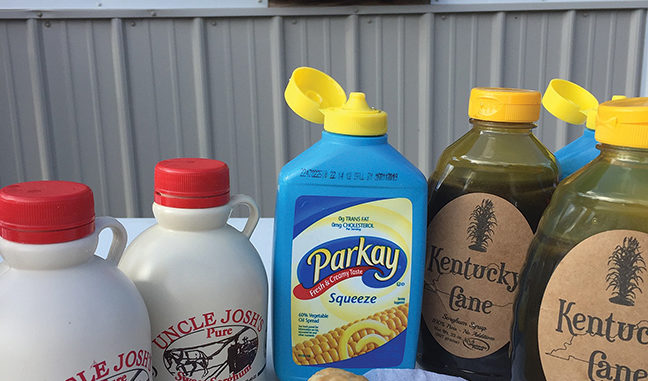
In western Kentucky, there is a small county with a rich history in sorghum. Hancock County, population 8,500, borders the Ohio River and touts a strong industrial and agricultural presence, but is also known for being the “Sorghum Capital of the World.”

Sorghum syrup is a natural sweetener similar to sugarcane molasses. The tall crop is a gluten-free cereal grain with deep roots in civilization’s past and in our own American history. As refined sugars became more readily available and less expensive after World War I, sorghum syrup production slowed in the South… except in Hancock County.
Like corn and other grains, there are different varieties of sorghum. Some types of sorghum are a popular feed for livestock, a hybrid form can produce bioenergy, and then there’s sweet stuff. Instead of being grown for the grain, sweet sorghum accumulates sugars in the stem. Those stalks are cut, collected, and crushed similar to sugarcane, and the juice must be cooked quickly to avoid fermentation. The result is an acquired taste of yesteryear – sorghum syrup.
The Independence Bank of Hancock County President Wade Gaynor wants to personally invite all of Kentucky and surrounding areas to the Sorghum Festival since the bank was instrumental in revitalizing the sweet tradition seven years ago.
“For us in Hancock County, sorghum is a large part of our heritage,” Gaynor said. “What better way to celebrate than a free festival showcasing our sorghum producers and local vendors.”
The Cox family owns and operates Kentucky Cane and provides the festival’s sorghum cooking demonstration, making and bottling a portion of their product to sell on site. Brody and Vanessa Cox’s son, Sy, is a six-year-old with an old soul. He already has big plans to be the family’s seventh consecutive generation sorghum producer. Sy doesn’t shy away from the Cox’s traditional approach to sorghum harvesting, which is cutting every stalk (acres and acres of sorghum!) by hand.
“That’s how we’ve always done it, and a lot of people tell me it (sorghum syrup) tastes like it used to,” Brody said. “For me, I know it’s nothing but sorghum going into the cane mill, a means of quality control.”
Josh Stephens of Hawesville is a sixth-generation sorghum producer. Stephens sells his Uncle Josh’s Sorghum at the festival and abroad via a large online platform.
But other than a biscuit topping, how else does a southerner…or anybody…actually eat sorghum?
“By puttin’ it on just about anything,” said little Sy Cox, who also declares sorghum’s (questionable) necessity on hotdogs.
Other Hancock County locals enjoy sorghum’s unique addition to salad dressings, barbeque, and even cookies. Craft distilleries throughout the South are looking to stock up on sorghum for use in spirits, and since sorghum may be substituted cup-for-cup in recipes calling for honey, maple syrup, or molasses, Sy Cox may be right, making the “Sorghum Capital of the World’s” heritage and annual celebration a syrupy-sweet one.
The Independence Bank Sorghum Festival will be held on October 26 at the Hancock County Fairgrounds. Along with free admission, visitors may shop local arts and food vendors, enjoy a quilt show, antique tractors, petting zoo, inflatables, live music, and best of all… unlimited biscuits drenched in local sorghum.
Old-Fashioned Sorghum Cookies
Dean Power’s recipe, Brody’s grandmother
1 ½ cups Crisco
2 cups white sugar
2 large eggs
½ cup sorghum
4 cups self-rising flour
2 teaspoons cinnamon
2 teaspoons ground ginger (or pumpkin pie spice)
Cream Crisco and sugar. Add eggs and sorghum. Add remaining ingredients. Work dough with hands. Roll into 1” ball, roll in a mixture of sugar and cinnamon. Flatten slightly onto greased cookie sheet. Bake at 350 degrees fahrenheit for 10 minutes.
Note: May add 1 teaspoon ground cloves, if desired.
-by Neena Gaynor
